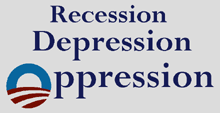 by Monty Pelerin –
by Monty Pelerin –
Our economic problems rightfully dominate the news. However, they are merely symptoms of a bigger, underlying problem: government.
For many, the previous paragraph is heresy. They “know” that government is necessary and good. They “know” that government solves problems and brings order to the chaos that would prevail in its absence. “They” are wrong!
Government has become little more than a carefully crafted myth based on propaganda disseminated by government itself. It has devolved into a scheme of plunder whereby the elites plunder the masses.
It did not start that way, at least not so egregiously. Government transmogrified into a vicious predator, preying on the wealth of the productive to enrich the political class and its cronies. It is no longer a force for good, but for evil. It has turned into the biggest criminal enterprise known to man.
This quote from Albert J. Nock is eight decades old, but appropriately describes what passes for government in Washington, D.C. today:
Taking the State wherever found, striking into its history at any point, one sees no way to differentiate the activities of its founders, administrators and beneficiaries from those of a professional-criminal class.
Americans have always viewed government skeptically. The vast majority of people still believe government is necessary. They also believe government is a potential, if not actual, evil because of its monopoly on power. Our Founding Fathers were explicit regarding this potential. George Washington described government as follows:
Government is not reason; it is not eloquent; it is force. Like fire, it is a dangerous servant and a fearful master.
A carefully crafted Constitution was drawn up to contain government and its power. Over time, it was effectively demolished. With it went most limitations on government.
The myth of government rests on two key assumptions — government is necessary and beneficial. Both are supported via the State’s propaganda machine. Few citizens recognize government as a predator enriching the elite. More realize that something is terribly wrong and that government has become too big and intrusive.
Government is deemed necessary because, it is claimed, there are things that the private sector would not or could not do, at least not efficiently. This assumption contains both a value judgment and an efficiency judgment.
The value judgment implies that individuals or firms would be unwilling to provide important services justifying government coercion to improve society. But this belief raises the question of whether the value judgments chosen are correct.
A small cadre of men imposing its will on the rest of society is very dangerous. Even if one accepts a particular role for government, it does not mean that the form which is implemented will be acceptable.
The efficiency aspect of government can be meaningfully explored. How well government has measured up on the efficiency criterion is discussed in the next section.
There are two levels on which to explore government efficiency:
The Macro Level pertains to the performance of government with respect to the economy.
Ludwig von Mises and Friedrich Hayek, leading figures in Austrian economics, maintained that an economy is too complex to be managed centrally. Infinite decisions based on infinite pieces of knowledge cannot be managed by a central decision-maker. From their standpoint, economies afford greater efficiency and satisfaction with limited government and a laissez-faire approach.
John Maynard Keynes and his disciples saw economies as inherently unstable. They believed that government management of an economy is necessary to ensure full employment and high output. For eighty-plus years, the Keynesian interventionist views have prevailed and enabled government to continue to grow and become increasingly intrusive.
Studies generally show an inverse relationship between large government and economic growth and well-being. These can hardly be termed decisive. Extreme cases of centralized economic management like Communist Russia, Communist China, Nazi Germany, Cuba, and North Korea are clear-cut. All were economic failures which produced great human tragedy.
East Berlin and West Berlin, North Korea and South Korea, and Taiwan and Communist China were laboratory-like experiments. In every instance, free-market economies dramatically outperformed government-directed economies.
The Social Welfare State has been the philosophy and excuse for bigger government. The European States, its leading proponent, are in process of failing. They will shortly be unable to meet their social promises and sovereign obligations. This collapse appears imminent and will likely signal the retreat of this philosophy, at least for a while.
The Micro Level pertains to individual programs run by governments.
The U.S. is an example of what is considered a mixed economy. Government runs some programs or sectors. Comparisons of efficiency at the federal level are difficult because there are virtually no private counterparts.
At the local level, direct comparisons are available. Publicly run and privately run services like garbage collection, transit systems, etc. often coexist among neighboring municipalities. These comparisons generally show public services to be higher-priced and lower in quality. Some studies have shown inefficiencies in the neighborhood of 100% — that is, private service are half the cost of public.
More devastating than direct efficiency comparisons is the tendency for government to eventually bankrupt everything it manages, including itself. Amtrak, the Postal Service, Social Security, Medicare, Fannie and Freddie, FHA, FDIC, FSLIC, Student Loans, etc. are some examples.
Major government initiatives are likewise judged failures. The War on Poverty, the Farm Program, the War on Drugs, etc. have wasted trillions of dollars and produced no improvements in terms of their intended objectives. Many programs actually made matters worse. The War on Poverty, for example, has created major disincentives regarding work which lead to increased poverty. Thomas Sowell argues that this program is responsible for many of the single-parent families and the breakup of the black family.
Government-directed investment or research fares no better. It is ineffective, wasteful, and corrupted by the political process. “Green energy” is the latest blatant example, being exposed for the fraud, favoritism, foolishness, and failure that is associated with crony Socialism.
Regulatory efforts often produce results opposite of their intentions. There is no crueler law in terms of harming the poor than the minimum wage.
Even if regulations are properly designed, they are ineffectively enforced. Bernie Madoff is one example. MF Global is another. Regulations were in place to prevent both. Regulators dropped the ball in both instances.
Regulatory failure produces only more regulation. The Dodd-Frank bill, so-called financial reform, consists of 2,300 pages, none of which will prevent another systemic failure. It is bad legislation that will not accomplish its stated objective. Likely it will do much to favorably influence the wealth of politicians and their friends.
ObamaCare is another recent example of unwise legislation/regulation. If implemented, it will cause health care to deteriorate and health costs to rise. It will likely cause the economic collapse of the government, assuming collapse does not happen prior to its full implementation.
These are a few examples of a list that could be expanded greatly. Every one of these government programs failed, at least with respect to their stated purposes. Every one of these programs will result in bankruptcy of either the program itself or contribute to the bankruptcy of the entire government.
Government supporters may argue that I cherry-picked the examples with a conclusion in mind. Yet these are the major programs of the last 50 years or so. None have succeeded. Furthermore, I am unaware of any major government program which has not failed in terms of its intended outcomes. I know of no government program that has stayed within budget.
It would be a valuable exercise for proponents of big government to create a list of programs which they believe have been successful. Those blinded by reality will make claims that some (all?) government programs have succeeded. I shall be happy to subject any so-called successful programs to an objective test based on intended objectives and cost considerations.
While they are busy compiling and defending their lists, the rest of us should be dealing with the problem of regaining control of a government gone wild before it bankrupts itself, the country, and its citizens.
HT: American Thinker



